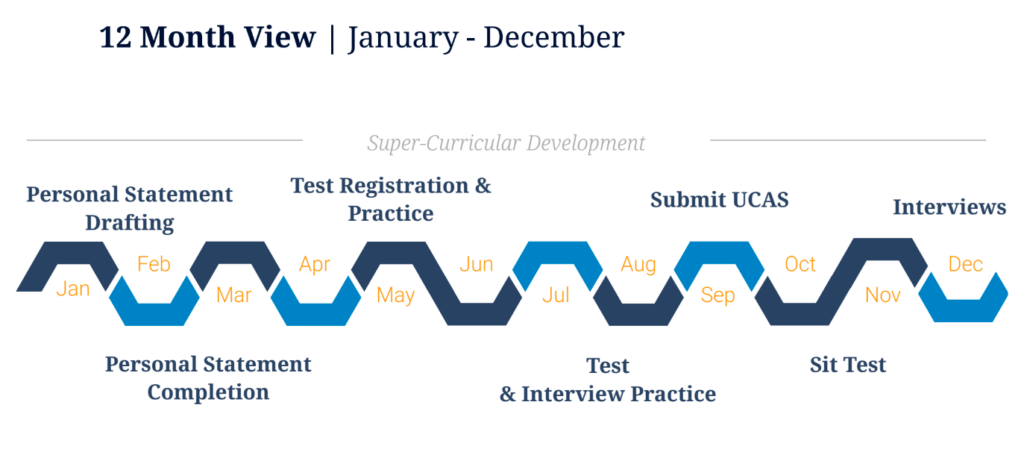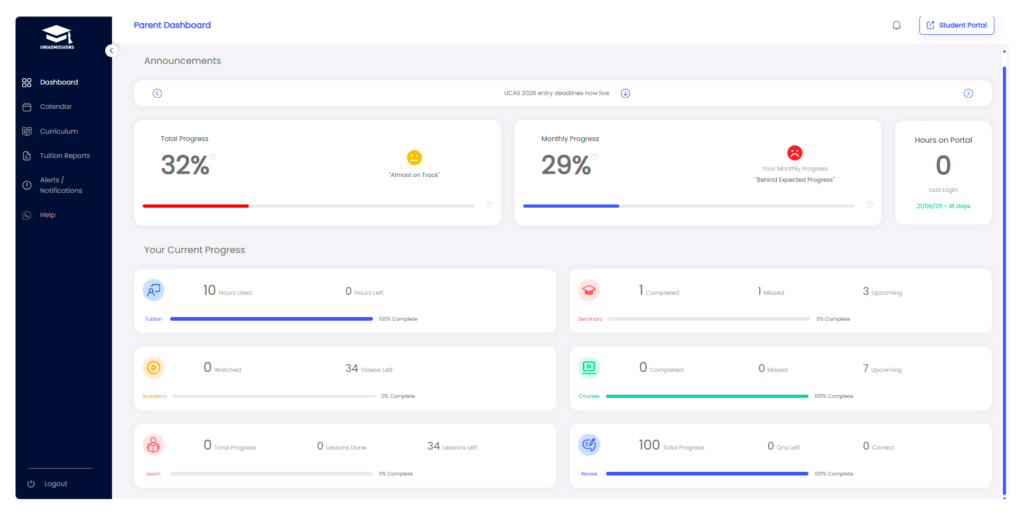Welcome to the Parents' Section
Applying to Oxford or Cambridge is a challenging process — and your support can make a big difference. From early deadlines to competitive admissions tests, it’s important to understand what your child will face and how to help them stay on track.
In the parent section, we will help you, as a parent, understand the process your child will be going through and provide tips for how you can support them in getting their offer.
How to support your child
Oxbridge is highly competitive — 2023 figures show just how tough the process is. Make sure your child understands the success rates for their chosen course so you can both assess how realistic their chances are.
Applicants can choose a specific college or leave it open for the university to assign one.
| 2024 Acceptance Rates | Applicants | Offers | Acceptances |
% of Applicants That Are Given an Offer |
% of Applicants That Are Accepted |
|---|---|---|---|---|---|
| Oxford | 23061 | 3793 | 3245 | 16% | 14% |
| Cambridge | 22153 | 3632 | 4760 | 21% | 17% |
| Overall | 44656 | 8274 | 6776 | 19% | 15% |
Most courses will require:
Personal Statement
Submitted through UCAS
Admission Test / Written Work
Depending on the course
Interview
If shortlisted
Each stage of the application is important and helps determine whether your child progresses to the next. Some admissions tests must be taken before the UCAS deadline, so make sure your child is aware of these dates so nothing is missed:
LNAT
Law: by 15 October 2026
UCAT
Medicine or Dentistry: by 26 September 2026
TMUA
Cambridge Computer Science or Economics: 13 or 14 October 2026
ESAT
Cambridge STEM courses (e.g. Engineering, Natural Sciences, Vet Med): 9 or 10 October 2026
Please note that the UCAS deadline for Oxbridge is earlier than other universities — applications, including the personal statement, must be submitted by 15 October for entry the following year.
What happens next?
If your child is shortlisted, they’ll be asked to submit written work or sit an admissions test (if they haven’t already). These usually take place in the last two weeks of October or early November, depending on the subject.
What’s next after the test?
If your child is successful at this stage, they’ll be invited to an interview in the first two weeks of December.
When will they hear if they’ve been accepted?
- Oxford sends out offers in mid-January.
- Cambridge uses a different system where applicants may be accepted, rejected, or placed in the ‘Winter Pool’—a process to match strong candidates to available places across colleges. Cambridge offers are usually released by 30 January.
International Applicants
All applications go through UCAS. Students from non-English-speaking countries may need to submit proof of English proficiency.
Are they a realistic Oxbridge candidate?
Top grades are essential straight A*/A’s (or equivalent) at GCSE and A-Level. Preparation should ideally start before GCSEs, not just in sixth form. To stand out, students must show a deep understanding of their subject and a genuine passion beyond the standard curriculum.
How can you support them:
- Encouraging subject-focused extracurricular activities
- Providing access to books and advanced resources
- Helping arrange real-world experience like volunteering or work placements
(For example, medicine applicants benefit from extra science classes, hospital volunteering, and advanced reading to show commitment).
What is Oxbridge looking for:
- Passionate, curious and eager to challenge
- Creative analytical thinkers
- Academic excellence and ambition
- More than just grades and UCAS forms
- Personal statements that shape interview questions
- Genuine enthusiasm and self-motivation in interviews
- Students close or meeting their predicted grades
- Dedicated to several hours a week to our support
- Motivated learners ready to go the extra mile for success
- Motivated learners ready to go the extra mile for success
- Expanding subject knowledge through activities
- Enriching learning with subject-related experiences
When should they start their application?
At UniAdmission, we recommend starting the UCAS application process early—from January—while also preparing for admissions tests and interviews.
For the 2026–27 cycle, applicants will submit a new UCAS personal statement, divided into three separate sections instead of one single statement.

As a parent, you’ll have access to a dedicated dashboard through your child’s personalised portal. This intuitive platform gives you real-time insights into their progress within the UniAdmissions programme.
Track completed tasks, monitor achievements, and receive timely alerts if your child falls behind, allowing you to step in and provide support when needed.
The Parents Dashboard empowers you to stay engaged in your child’s academic journey, helping create a supportive, collaborative environment for success.
Why Uniadmissions?
The first school focused exclusively on Oxbridge applications, especially for Medicine and Law.
Get the UniAdmissions' Prospectus
For full details on our programmes, please download our prospectus

FAQs
Please see a list of the most common questions about applying to Oxford and Cambridge.
What are the most competitive courses?
Medicine, Economics, Law, Computer Science, PPE, Engineering, and Mathematics.
Why do you limit the number of students?
We focus on quality and outcomes, not quantity. Keeping numbers low ensures personalised support and better results.
Will Oxbridge know my child has received support from UniAdmissions?
No. We are independent from Oxford and Cambridge, so they won’t know unless you choose to disclose it.
What does an average week look like?
We recommend 3-4 hours weekly, including 1-on-1 tutoring, homework, pre-reading, seminars, and independent study. We’re flexible—some weeks may require less time, but consistency is key.
How much does it cost?
Fees vary depending on the programme and start date.
What payment methods do you accept? Can I pay in instalments?
We offer secure payments via debit/credit card (Visa, Mastercard, Amex), bank transfer, Stripe, Splitit, or PayPal. Instalment plans are available for UK students only.
My child is an international applicant, and English is not their first language. Will they need to take an additional qualification?
Yes, most UK universities — including Oxford and Cambridge — require proof of English language proficiency to ensure your child can succeed in an English-speaking academic environment. If this requirement isn’t met at the time of application, it may form part of a conditional offer that must be fulfilled by August before the course starts.
For the most accurate and detailed information, please visit the official English language requirements pages on the Oxford University website and the Cambridge University website.
For more guidance, see How To Support Your Child During The Oxbridge Application.

